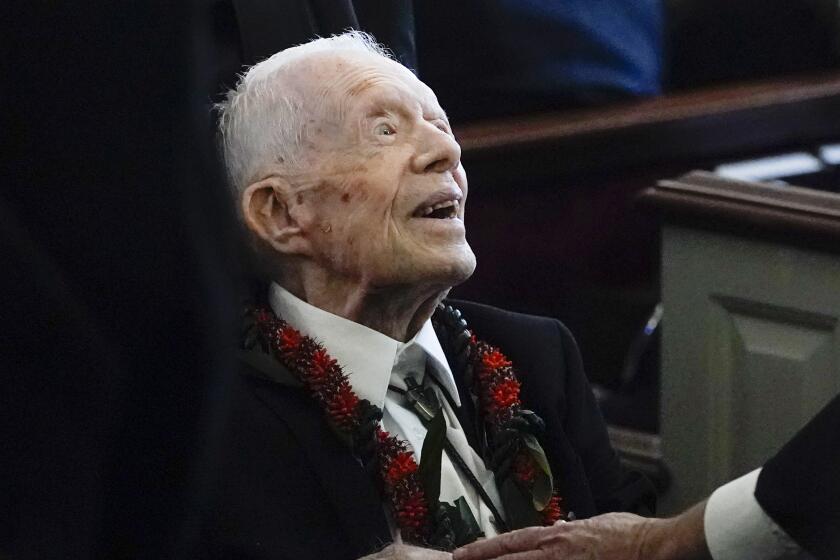CAMPAIGN ’96 : Oregon’s Mail-In Vote Winds Up
Last-minute voters braved frigid winds and icy roads to drop off their ballots Tuesday at the close of Oregon’s U.S. Senate special election, the nation’s first major vote-by-mail contest and an early barometer of the 1996 political year.
No results were available at press time for this edition Tuesday night.
With tracking polls showing Democrat Ron Wyden, 46, and Republican Gordon Smith, 43, within a hair’s breadth, both campaigns had shifted into overdrive in a last-minute effort to lure ballots out of undecided and procrastinating voters.
Wyden chatted for three hours Monday night on a toll-free call-in line, then hit the Portland light rail commuter train Tuesday morning to pursue voters on their way to work; Smith dropped by a pair of pancake houses in eastern Oregon in what he ruefully admitted was a hectic chase after a diminishing pool of potential supporters--the recalcitrant thousands who still held their ballots three full weeks after receiving them in the mail. Voters who had not yet mailed in ballots had until 8 p.m. Tuesday to return them to designated drop-off sites.
State election officials said turnout among the 1.8 million registered voters would almost certainly reach 65%, a figure far above normal for special elections but still short of the historically high voter participation in Oregon’s general elections.
Political groups from across the country sent money and troops to Oregon to join a fight that was widely seen as a bellwether of voter attitudes. The election was called after the resignation last fall of longtime Republican Sen. Bob Packwood, who faced sexual harassment charges. Packwood’s vacant seat left the GOP controlling the Senate, 53 to 46.
Early in the race, the Democratic Senatorial Campaign Committee said in a statement: “The special election in Oregon presents us with a great opportunity not only to gain a seat, but to redefine the political environment as we head into the 1996 cycle.”
A press release issued Tuesday by the Republican National Committee said the close race was “a strong statement about the strength of Republican ideas. From the outset, Democrats and most in the media considered this race the Democrats’ to lose.”
Ultimately, if the Senate race proves anything, it may be that neither party has a lock on voters’ hearts going into the 1996 presidential race. As with many other states, the fastest growing bloc of voters in Oregon is registered as independent.
A flood of money poured into the campaigns in recent days, more than 85% of it from outside Oregon. The contributors ranged from director Steven Spielberg and DreamWorks movie studio partners David Geffen and Jeffrey Katzenberg on the Democratic side to Texas oilman Roy M. Huffington and Coca Cola, Arco and Texaco for Smith.
Smith, a multimillionaire businessman and one-term state Senate president who injected $2 million of his own money into the campaign, has raised $4.3 million and spent much of it on a three-week-long television blitz during the mail balloting period. Wyden, a 15-year congressman from Portland, raised $3.2 million.
The two candidates drew a clear line on such issues as balancing the budget, federal timber policy and tax cuts for the middle class that echoed much of the present political debate in Washington. But at times, both candidates sought a middle course.
Smith, for example, declined to come out for an outright ban on early-term abortions; Wyden, a traditional supporter of senior citizens and one of the founders of the Gray Panthers, proposed his own package of Medicare cuts.
Along with clues the contest might provide about the rest of the election year, the race provided political analysts a chance to examine a host of issues relating to the conduct and impact of voting by mail.
Oregon State University student body president Jon Isaacs said he counted 110 unclaimed student ballots at a single fraternity, an example of what he said is mail balloting’s potential for disenfranchising young and low-income people who move frequently.
“Students may move three or four times a year, and they’re just not getting their ballots,” he said in an interview.
Isaacs received four ballots in the mail, most to the wrong address; Smith, the candidate, received two.
Secretary of State Phil Keisling said authorities were investigating at least one case of a voter who appears to have returned two ballots, an offense which he said could be prosecuted as a felony.
Also of interest to analysts is the way in which mail balloting will affect the composition of the electorate.
Oregon State University political scientist Bill Lunch predicted it would favor voters who are older, affluent and better-educated, a potential boost to the Republicans, discounting Wyden’s strong ties to senior citizen groups.
Other national analysts looked at issues as simple as the mail itself: Does the 32-cent postage stamp voters must affix to their ballots constitute a poll tax?
Keisling said the mail ballot reflects the new reality of families who often can’t get to the polls on a single election day. “You can end up disenfranchising thousands of people who are home with a sick child or a soccer game or even bad weather. Can you imagine waking up, as many people are, to six inches of snow and a wind chill and having a polling election?” Keisling said.
“We just need to recognize the reality of single-parent households, two-income families, people who are working for themselves, people who have the best intentions on election day but who increasingly fall victim to the kind of daily logistics that simply have to do with life,” he said.
More to Read
Sign up for Essential California
The most important California stories and recommendations in your inbox every morning.
You may occasionally receive promotional content from the Los Angeles Times.










